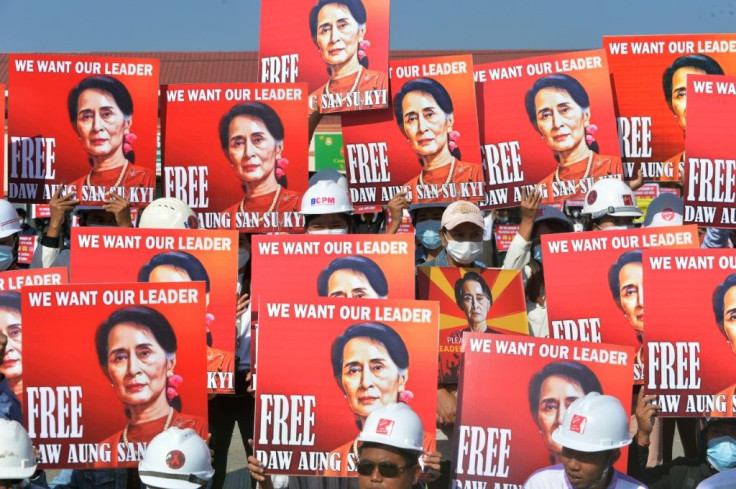Myanmar's Suu Kyi Hit With New Convictions, Jail Term
A Myanmar junta court on Monday convicted Aung San Suu Kyi of three criminal charges, sentencing her to four years in prison in the latest in a slew of cases against the ousted civilian leader.
The Nobel laureate has been detained since February 1 when her government was forced out in an early morning coup, ending Myanmar's short-lived experiment with democracy.
The generals' power grab triggered widespread dissent, which security forces sought to quell with mass detentions and bloody crackdowns in which more than 1,400 civilians have been killed, according to a local monitoring group.
A source with knowledge of the case told AFP the 76-year-old was found guilty of two charges related to illegally importing and owning walkie-talkies and one of breaking coronavirus rules.
Junta spokesman Major General Zaw Min Tun confirmed the verdicts and sentences and told AFP Suu Kyi would remain under house arrest while other cases against her proceed.
The walkie-talkie charges stem from when soldiers raided her house on the day of the coup, allegedly discovering the contraband equipment.
The United States condemned what it called the "unjust arrest, conviction and sentencing" of Suu Kyi, which it said was carried out in "an affront to justice and the rule of law."
"We call on the regime to immediately release Aung San Suu Kyi and all those unjustly detained, including other democratically elected leaders," State Department spokesman Ned Price told reporters.
Monday's sentence adds to the penalties the court handed down in December when she was jailed for four years for incitement and breaching Covid-19 rules while campaigning.
Junta chief Min Aung Hlaing cut the sentence to two years and said she could serve her term under house arrest in the capital Naypyidaw.
The total six-year jail term would mean Suu Kyi would not be able to participate in fresh elections that the military authorities have pledged to hold by August 2023.

December's ruling drew international condemnation, and the Myanmar public reverted to old protesting tactics of banging pots and pans in a show of anger.
The Norwegian Nobel Committee, which awarded Suu Kyi the Peace Prize in 1991, said it was "deeply concerned about her situation," with chairwoman Reiss-Andersen calling Monday's verdict "a politically motivated ruling."
Journalists have been barred from attending hearings, and Suu Kyi's lawyers have been muzzled from speaking to the media.
The verdicts come days after Cambodian strongman Hun Sen -- who currently holds the chair for regional bloc ASEAN -- held talks with Min Aung Hlaing in Naypyidaw.
ASEAN has sought to use its influence to defuse the Myanmar crisis, but Hun Sen's visit attracted criticism from rights groups and anti-junta activists.
Under a previous junta regime, Suu Kyi spent long spells under house arrest in her family mansion in Yangon, Myanmar's largest city.
Today, she is confined to an undisclosed location in the capital, with her link to the outside world limited to brief pre-trial meetings with her lawyers.
Besides Monday's cases, she is also facing multiple counts of corruption -- each of which is punishable by 15 years in jail -- and of violating the official secrets act.
Deputy Asia director at Human Rights Watch Phil Robertson condemned Monday's convictions.
"The Myanmar junta's courtroom circus of secret proceedings on bogus charges is all about steadily piling up more convictions against Aung San Suu Kyi so that she will remain in prison indefinitely," he said in a statement.
In November, she and 15 other officials, including Myanmar's president Win Myint, were also charged with alleged electoral fraud during the 2020 polls.
Her National League for Democracy party had swept the elections in a landslide, trouncing a military-aligned party by a wider margin than the previous 2015 election.
Since the coup, many of her political allies have been arrested, with one chief minister sentenced to 75 years in jail. Others are in hiding.
© Copyright AFP 2024. All rights reserved.







